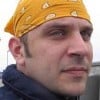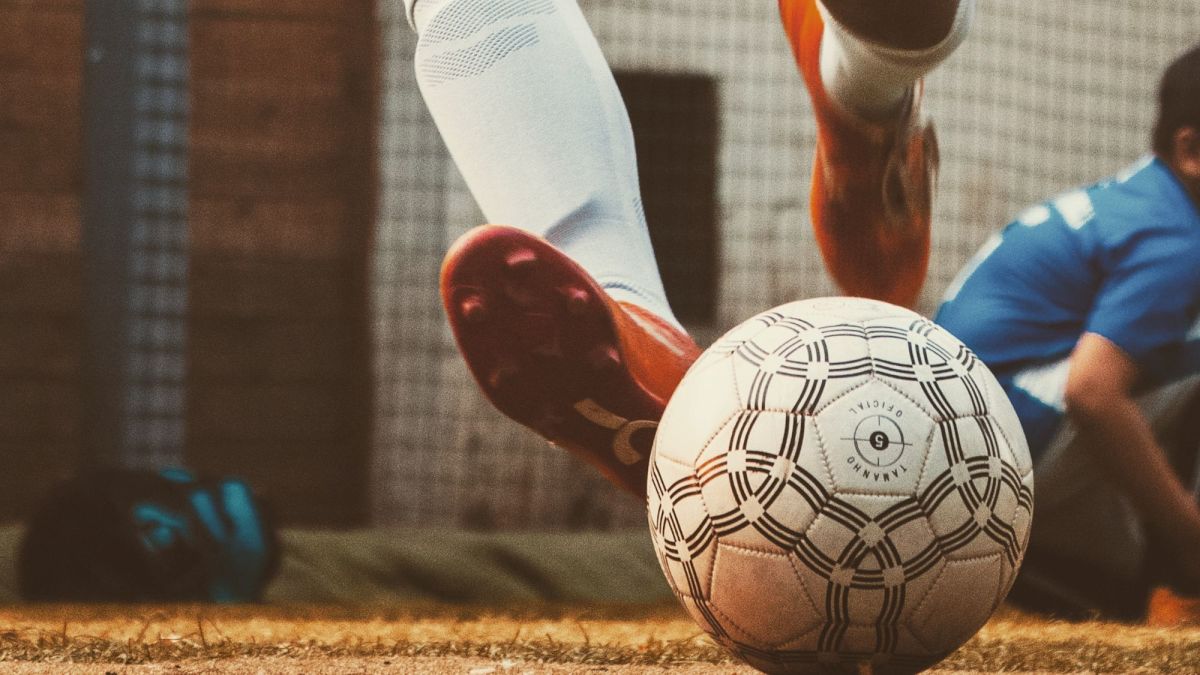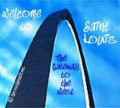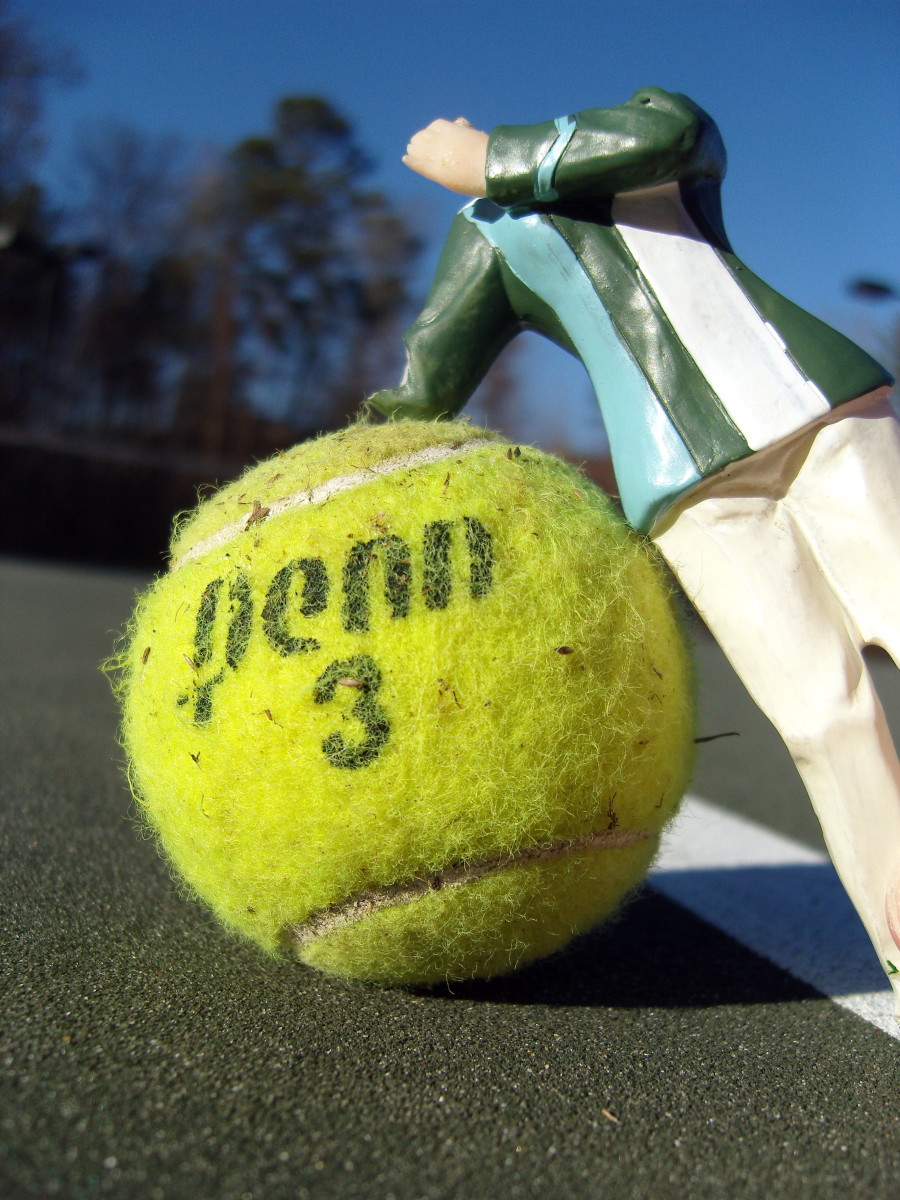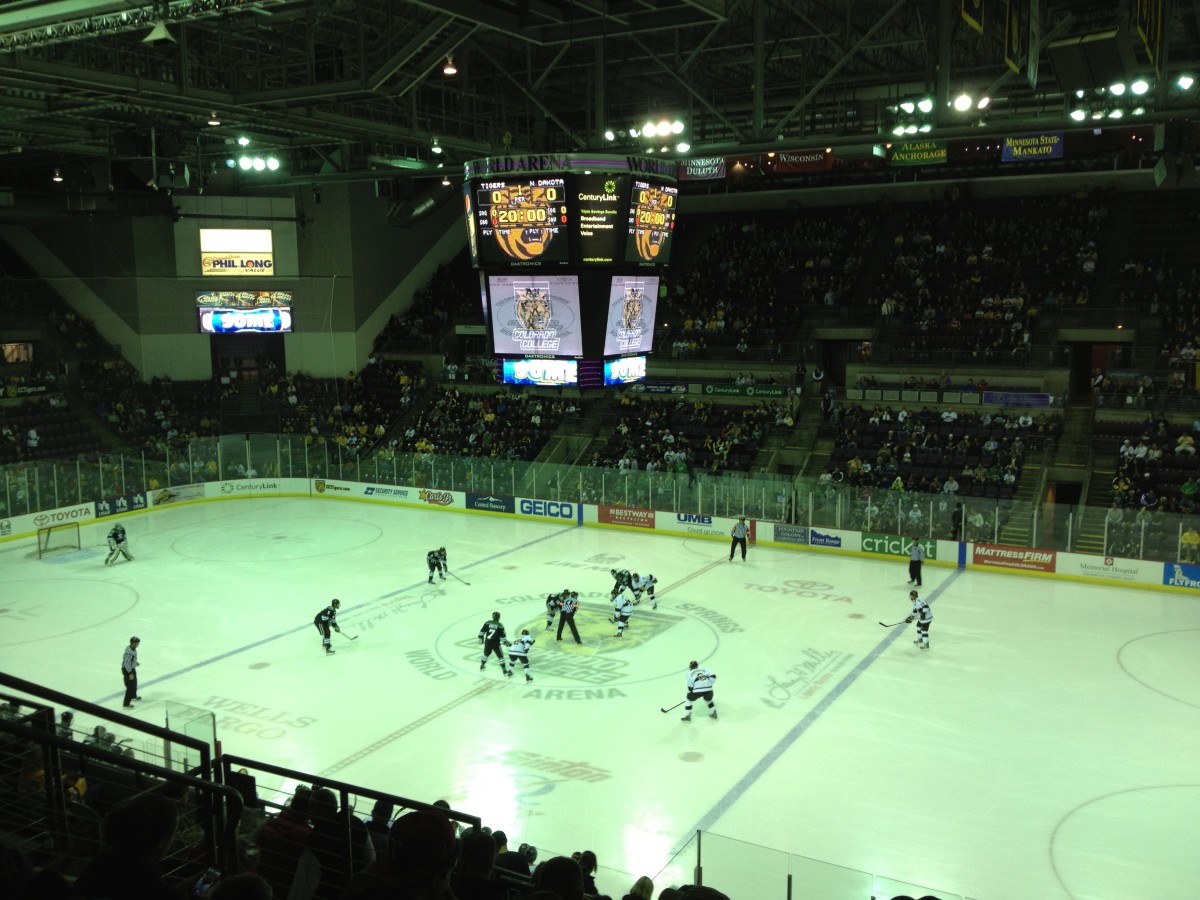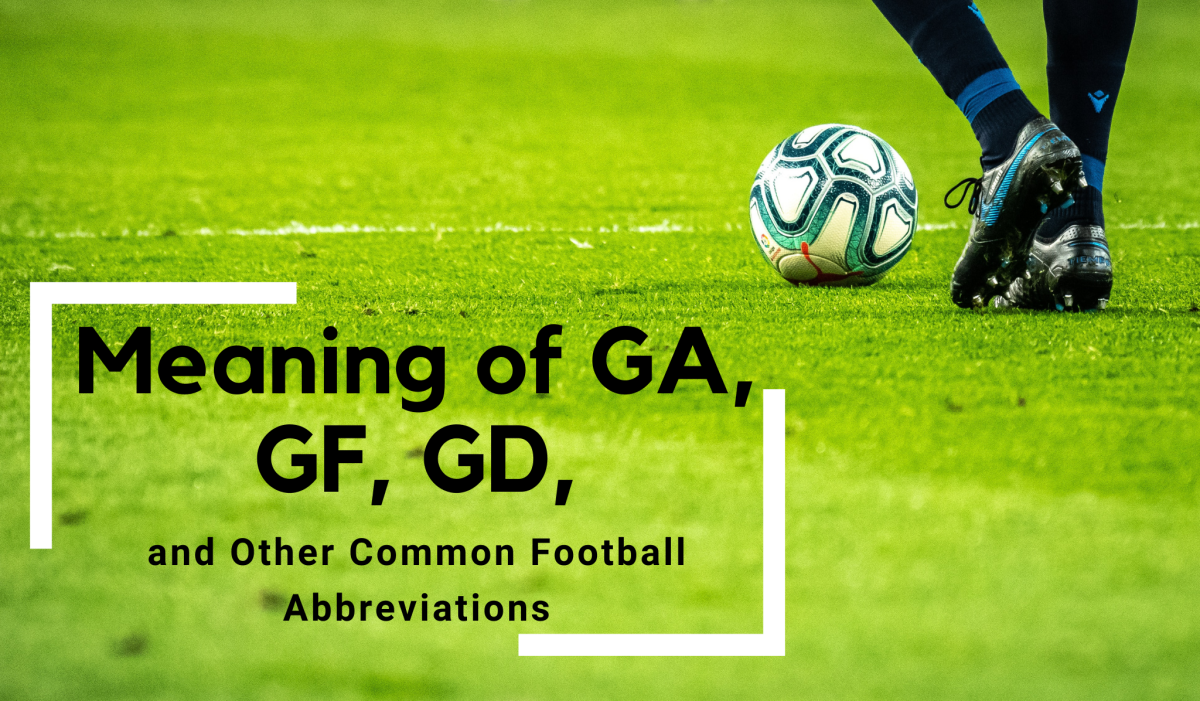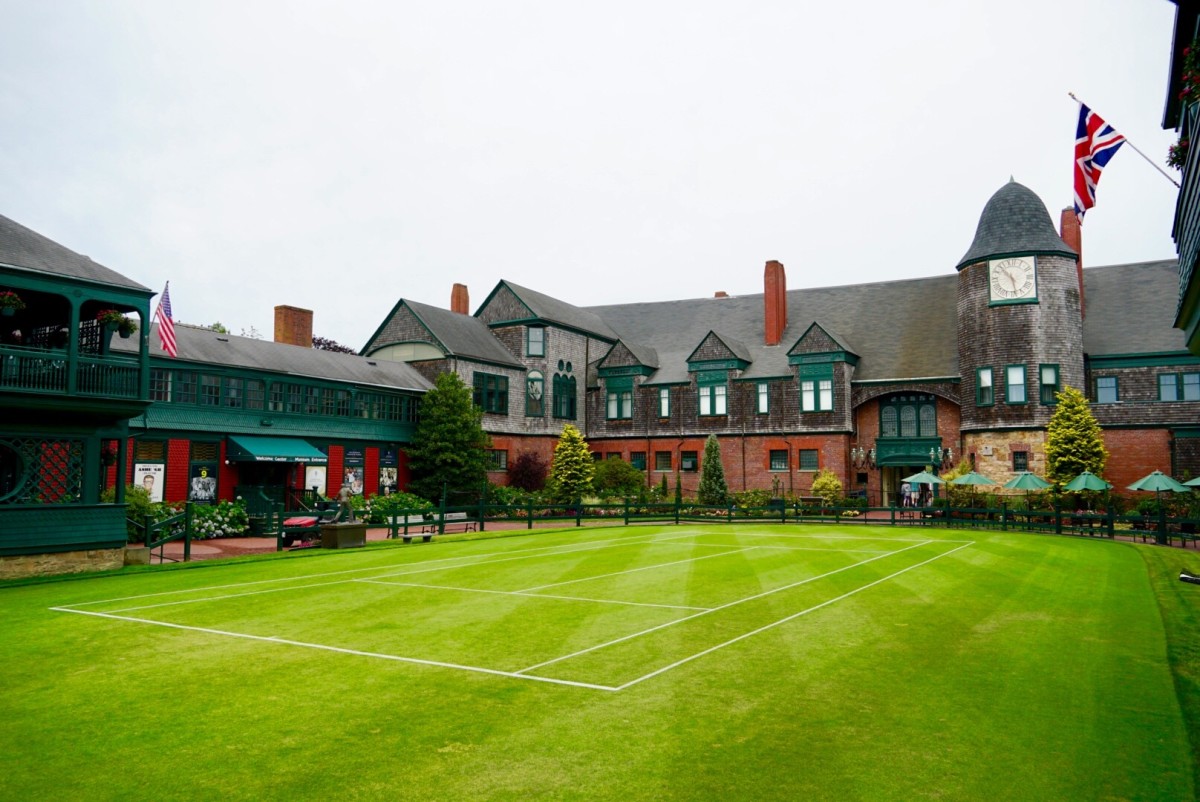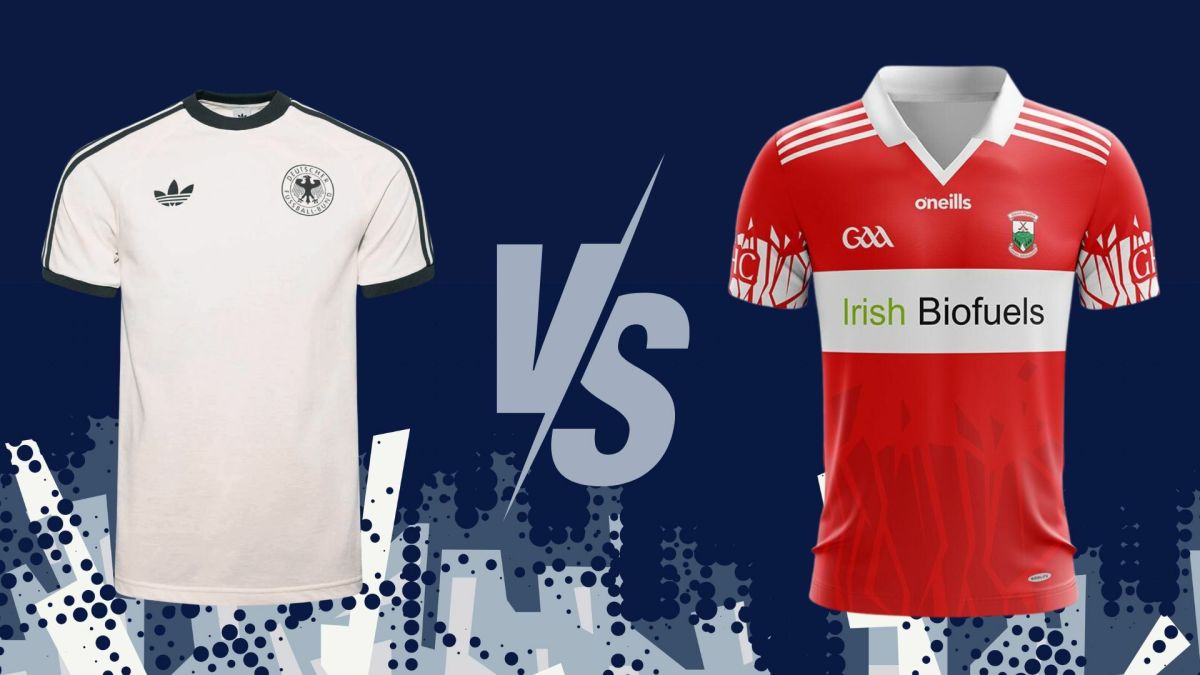History of Saint Louis Hockey
St. Louis Flyers
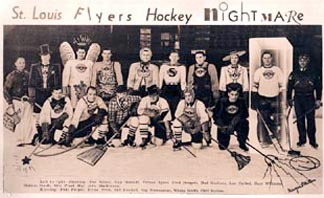
The St. Louis Flyers played their home games at the St. Louis Arena, better known as the "The Barn" or later as the “Checkerdome”. At the time of its construction, the Arena was hailed as the most modern and complete sports facility in the United States.
The Flyers played fourteen seasons in the American Hockey Association (a minor pro league that existed between 1926 and 1942) from 1928 to 1942, and played nine seasons in the American Hockey League from 1944 to 1945 and 1952 to 1953. This was St. Louis' only AHL team. The Saint Louis Blues currently have an AHL team, The Peoria Rivermen, but they are located in Peoria, Illinois.
In 1932, St. Louis was the seventh largest city in the United States. The city applied for an NHL franchise several times but they were denied because travel to the Midwest was considered too expensive. Back then everyone had to travel by train, which was costly, especially during the Great Depression.
The St. Louis Eagles

St. Louis had applied for an NHL team in 1932 but they were shot down due to high travel costs. With the Philadelphia Quakers having to cease operations, the NHL decided that they did not want to lose another NHL team as well. So, when the Ottawa Senators asked the NHL to temporally cease operations due to financial hardships, the NHL moved the team to Saint Louis. There the club was renamed the Eagles, inspired by the logo of the Anheuser-Busch brewing company. At the time there were nine teams in the NHL. The teams were divided into two divisions, the Canadian and the American. The Eagles should have been placed in the American Division, but they were kept in the Canadian division, for whatever reason.
The St. Louis Eagles started the 1934 NHL season on November 8th 1934 at home. There were 12,622 fans in attendance and they lost 3 to1 to the Chicago Black Hawks. Two nights later they posted their first victory at home with a 4 to 2 win over the New York Rangers. Unfortunately, the Eagles would then lose eight games in a row, causing a big loss of the fan base, before picking up a 2 to 0 shutout win over the New York Americans. Because of the diminished fan base, St. Louis was forced to trade two of its star players. They lost Captain Syd Howe and Ralph Bowman to Detroit for Teddy Graham and $50,000. This had to be done to try and keep the team afloat, even though it was already run on a shoestring budget. Carl Voss led the team in scoring with 31 points and Howe contributed 27 points in his 36 games with the Eagles before the trade. The final win in the brief history of the club was on March 12, 1935 with a 5 to 2 win over the Detroit Red Wings. The last time the Eagles took the ice was against the Maple Leafs in Toronto a week later.
The Eagles ownership had lost $70,000 by occupying Ottawa's old spot in the Canadian Division. Though the Eagles were much closer to Chicago and Detroit who played in the American Division. The long, expensive road trips by train wore on the team's bottom line and affected their on-ice performance as well. At the conclusion of the season, the owners of the franchise asked the NHL for permission to suspend operations for a year. Instead the league decided to revoke the franchise though, purchasing all of the players contracts for $40,000.00 and then dispersing them to other NHL teams. There were other interests in the team, mainly from Cleveland and also in a return to Ottawa, but neither came to fruition. Although there was a potentially solid fan base in St. Louis, the economy was too much of a deterrent for the NHL to succeed in the city. Because of this the Eagles would fade away after a single season. In 1938, the Montreal Maroons attempted to move to St. Louis, but were denied by the NHL due to the high travel costs that plagued the Eagles.
The Saint Louis Blues
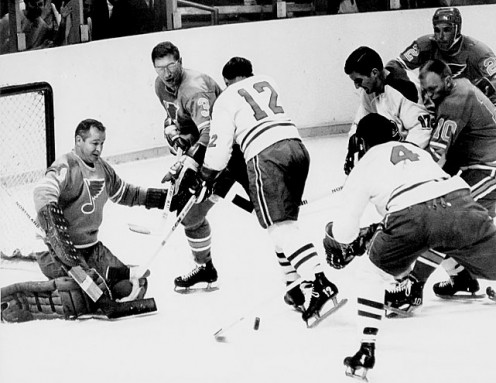
It took 32 years but Saint Louis finally had another NHL team. The Saint Louis Blues were founded in 1967 as one of the expansion teams, even though St. Louis never applied for a team. The owner of the Chicago Blackhawks owned the St. Louis Arena and wanted to unload it. The owners of the Blues, paid a $2 million expansion fee, $4 million to purchase the Arena, $2.5 million more to renovate the building, and also had to pay $50,000 per player claimed in the expansion draft. The Blues played their first game on October 11th at the old St. Louis Arena where they tied the game at a 2 to 2 draw against the Minnesota North Stars. In the first year, the Blues were able to coax a former top NHL star, Dickie Moore, out of retirement. He played in 27 regular season games that year and had 8 points and played in 18 Playoff games and had 14 points before retiring again. This along with the veteran goal tending tandem of Glenn Hall and Jacques Plante proved a success, the two won a Vezina Trophy in 1969. Phil Goyette won the Lady Byng Trophy for the Blues in 1970 and Red Berenson became the expansion team's first major star at center. The Arena quickly became one of the loudest buildings in the NHL, a reputation it maintained throughout its tenure as the Blues' home. Attendance went from 8,897 in 1967-68 to 18,238 in 1970-71. The owners were quite generous as well. They treated the players to free Florida vacations, bought them gold watches for scoring hat tricks, and even cars. When Red Berenson scored six goals in a game on Nov. 7, 1968, the owners gave him a brand new station wagon, a canoe attached to the top, and a Browning 20-gauge shotgun inside. The team would make it to the Stanley Cup Finals in each of its first three seasons; and would eventually make it to the playoffs for 25 consecutive years, from 1979 through 2004.
St. Louis Arena

The Blues Financial Plague and Various Ownership
The team has had a lot of financial issues, causing a loss of many of its great players. (1)Sid Salomon Jr. was getting older and he let his son take over in the mid 1970's. His son began changing coaches and general managers like most people change their underwear and a lot of the star players began retiring. This along with the declining revenue caused ownership to cut the team's staff down to three employees and finally had to sell the team to Ralston Purina in 1977. (2)Purina's longtime chairman, R. Hal Dean retired in 1983, and his successor didn’t think that losing $1.8 million a year was a wise business decision and abandoned the team. Purina did not even send a representative to the 1983 NHL Entry Draft. (3)Harry Ornest saved the team in 1983, even though he scraped by to pay his players a basic salary, the team still remained competitive. (4)In 1986 the team was sold to a group led by St. Louis businessman Michael Shanahan. (5)In 1999 Wal-Mart heir Nancy Walton Laurie and her husband Bill purchased the team. (6)In 2006 the Lauries sold the Blues to SCP Worldwide. (7) In 2012 Summit Distributing CEO Tom Stillman purchased the team.
Most hated coach and general manager of all time.
Mike Keenan coached the Blues from 1994 to 1996. I am not going to go into detail here, as this would take up hundreds of pages on why this joker is so hated in St. Louis. But here is a quick low-down: We lost a lot of great players because no one could get along with Keenan. Here is a list of some of the players we lost thanks to “Iron Mike”. Curtis Joseph, Wayne Gretzky, Brett Hull, Doug Gilmore, Scott Stevens, Brendan Shanahan, and Chris Pronger.
Mike Keenan
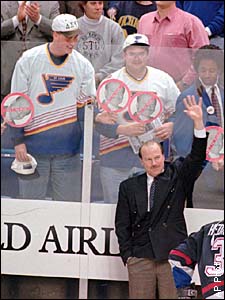
Hall of Famers
Glenn Anderson RW 1994/95, 95/96
Al Arbour Coach 1970/71, 1971-1973
Scotty Bowman Coach 67-70, 70/71
Bernie Federko C 1976-1989
Emile Francis Coach 1976/77, 81-83
Grant Fuhr G 1995-1999
Doug Gilmour C 1983-1988
Wayne Gretzky C 1995/96
Glenn Hall G 1967-1971
Doug Harvey D 1967-1969
Dale Hawerchuk C 1995/96
Brett Hull RW 1987-1998
Guy Lapointe D 1981-1983
Al MacInnins D 1994-2004
Dickie Moore RW 1967/68
Joe Mullen RW 1979/80, 1981-1986
Adam Oates C 1989-1992
Jacques Plante G 1968-1970
Peter Stastny C 1993-1995
Scott Stevens D 1990/91
Coaches past to present
Lynn Patrick 1967/68
Scotty Bowman 1967/68-1969/70
Al Arbour 1970/71
Scotty Bowman 1970/71
Sid Abel 1971/72
Bill McCreary 1971/72
Al Arbour 1971/72-1972/73
Jean-Guy Talbot 1972/73-1973/74
Lou Angotti 1973/74-1974/75
Lynn Patrick 1974/75
Garry Young 1974/75-1975/76
Lynn Patrick 1975/76
Leo Boivin 1975/76
Emile Francis 1976/77
Leo Bovin 1977/78
Barclay Plager 1977/78-1979/80
Red Berenson 1979/80-1981/82
Emile Francis 1981/82-1982/83
Barclay Plager 1982/83
Jacques Demers 1983/84-1985/86
Jacques Martin 1986/87-1987/88
Brian Sutter 1988/89-1991/92
Bob Plager 1992/93
Bob Berry 1992/93-1993/94
Mike Keenan 1994/95-1996/97
Jimmy Roberts 1996/97
Joe Quenneville 1996/97-2003/04
Mike Kitchen 2003/04-2006/07
Andy Murray 2006/07-2009/10
Davis Payne 2009/10-2011/12
Ken Hitchcock 2011/12-Present
Awards
Jack Adams Award (Top Coach):
1981 Red Berenson
1991 Brian Sutter
2000 Joel Quenneville
2012 Ken Hitchcock
Calder Trophy (Top Rookie):
2003 Barret Jackman
Masterton Trophy (Dedication):
1981 Blake Dunlop
1998 Jamie McLennan
Lady Byng (Gentlemanly Play):
1970 Phil Goyette
1990 Brett Hull
2000 Pavol Demitra
Selke Trophy (Defensive Fwd):
1990 Rick Meahger
Norris Trophy (Defenseman):
1999 Al MacInnis
2000 Chris Pronger
Vezina Trophy (Top Goalie):
1969 Jacques Plante & Glenn Hall
Jennings Trophy (goaltenders (with a minimum of 25 games played) for the team with the fewest goals against in the regular season)
1999-2000, Roman Turek
2012 Jaroslav Halak and Brian Elliott
Hart Trophy (NHL MVP):
1991 Brett Hull
2000 Chris Pronger
Conn Smythe (Playoff MVP):
1968 Glenn Hall G
Greatest Moments in Blues History
March 17, 1991
St. Patrick's Day Massacre
In the game, the two teams, who were fighting for the Presidents' Trophy got into a brawl after Glen Featherstone shoved Jeremy Roenick after his hard hit on Harold Snepsts. Keith Brown shoved Featherstone, beginning a brawl. Twelve players, six on each team, were ejected.
May 12, 1986
The Monday Night Miracle
Greg Paslawski scored two late third period goals to send Game 6 of the Conference Finals into overtime. But Doug Wickenheiser was the hero, scoring the game winner in overtime to complete arguably the most remarkable comeback in Blues history.
November 7, 1968
Red Berenson scores an amazing six goals as the Blues shutout the Philadelphia Flyers, 8-0 in Philadelphia. Berenson went on to score 35 goal that season to lead the Blues. The NHL record for the most goals in one game (seven) was set by Joe Malone on January 31, 1920. This can be seen at http://video.nhl.com/videocenter/console?catid=0&id=20190
